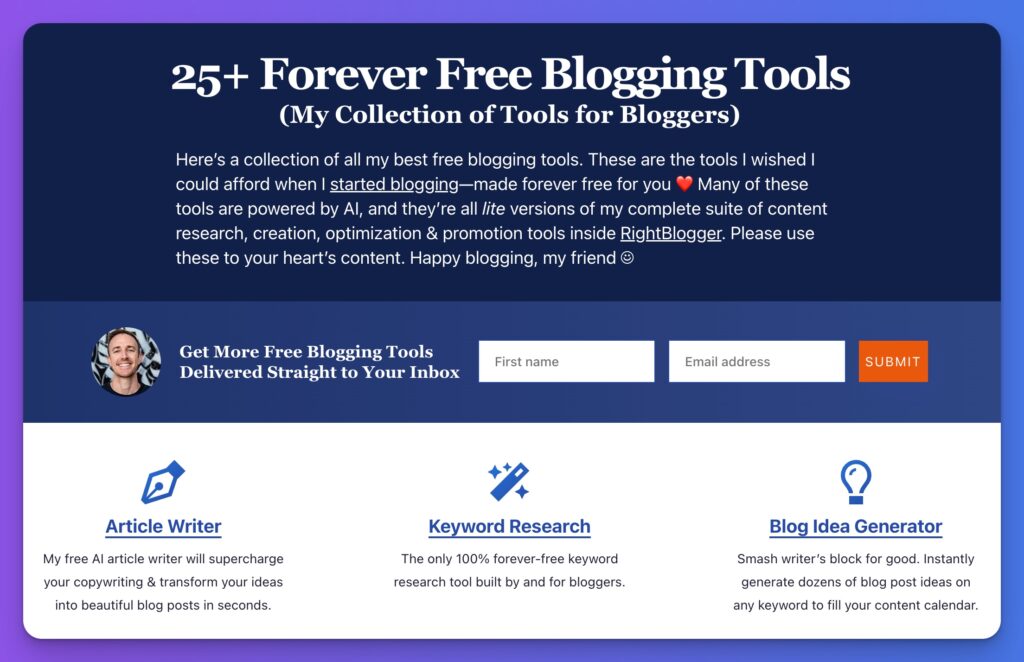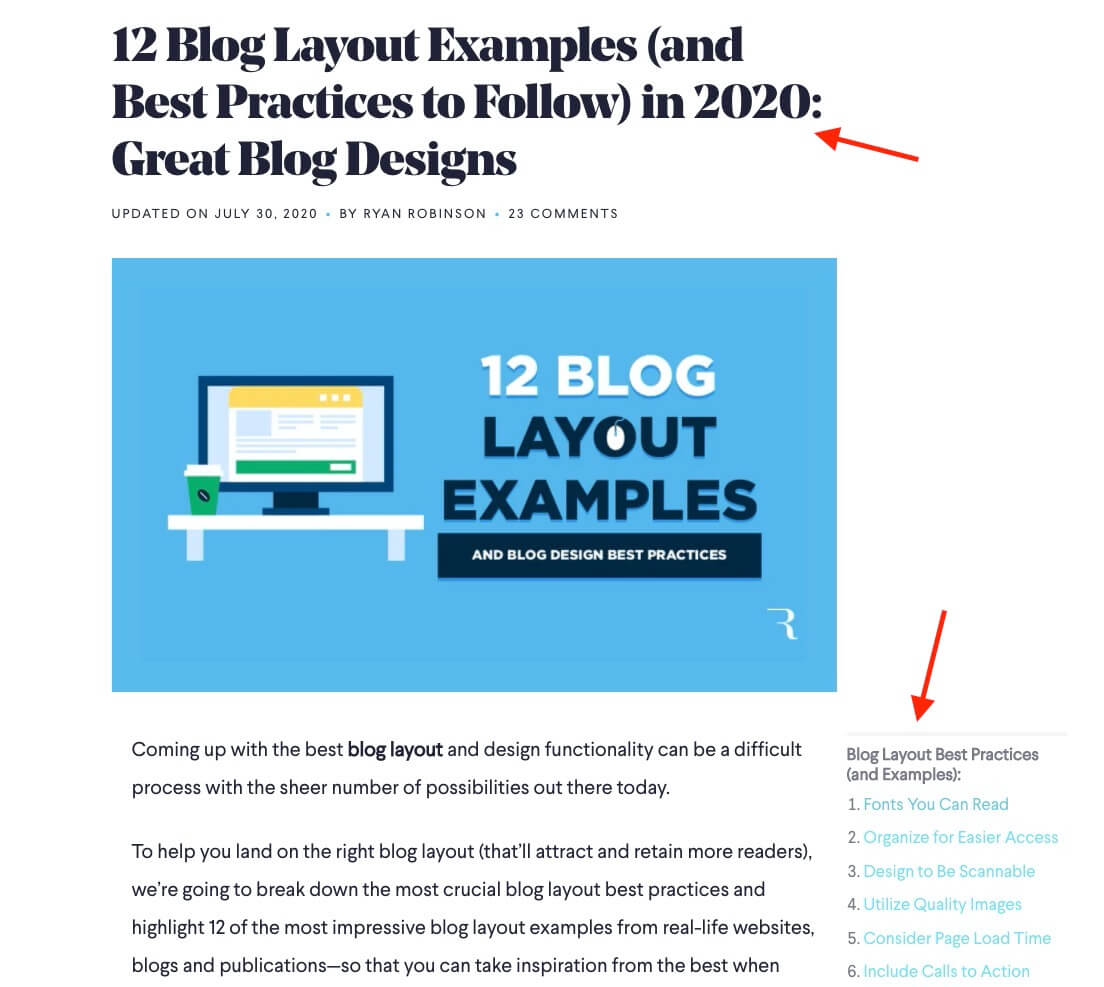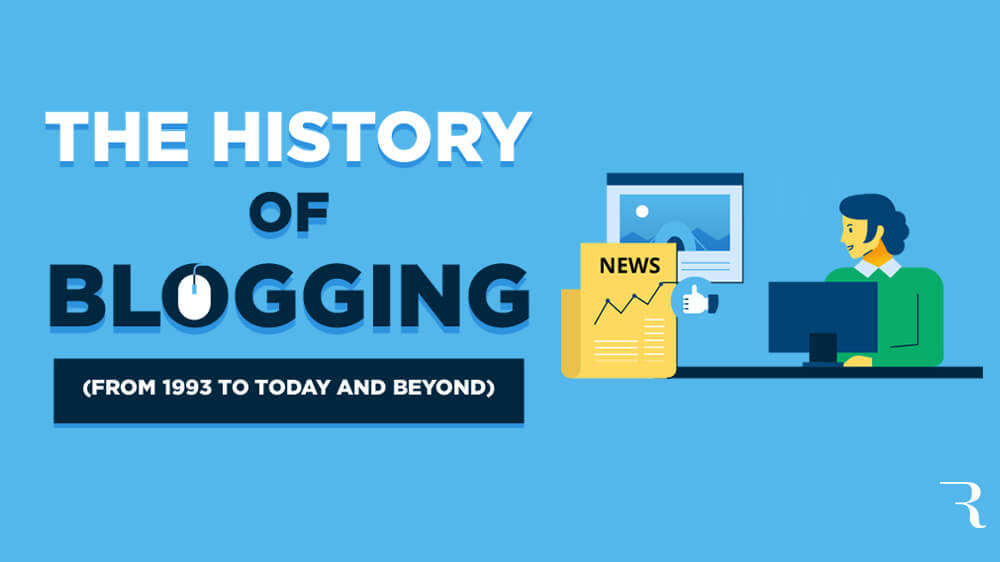We’re here to answer, do people still read blogs? So, let’s get right to it.
Do people still read blogs?
Yes, people still read blogs today (in record numbers) and will almost certainly continue reading blogs for many years to come. In fact, an overwhelming 77% of Internet users report regularly reading blog posts according to the latest blogging statistics.
However, despite a consistent increase in the number of people reading blogs, how we read them (and the types of content people like reading) is changing quite a lot. The average reader only spends 37 seconds reading a blog post today, which makes clear that most people are unlikely to read an entire blog post from start to finish—and instead scan for the information they’re looking for.
So, if you’re wondering… are blogs still a thing? Well, the evidence is clear that people do still read blogs in record numbers today (and yes bloggers still make money). However, it’s never been more important to create a great scannable content experience for your readers—so that they can quickly locate the answers they’re seeking and move on with their busy lives. Having worked as a blogger, business owner, writer and content marketer myself, that’s something I have a lot of experience with.
Over the years, I’ve been teaching 500,000 monthly readers how to start a blog on the right foot—and one of the most important aspects of that process has become choosing a blog layout and design that delivers a great experience for your readers… thus encouraging them to come back for more.
So with that goal in mind, let’s talk a little more about how to make sure people still read your blog.
Do People Still Read Blogs? (Is Blogging Finally Dead in 2024?)
- Do People Still Read Blogs?
- Why People Read Blogs (Today)
- Best Practices for Designing a Blog People Will Read
Disclosure: Please note that some of the links below are affiliate links and at no additional cost to you, I’ll earn a commission. When you make a purchase using my one of my affiliate links, the company compensates me, which helps me run this blog and keep my content free of charge to you. Know that I also only recommend products I personally stand behind.
Alright, now let’s dig a little deeper into the question of do people still read blogs? and of course, examine whether or not blogging is finally dead in 2024. After it’s all said and done, I think you’ll agree when I say blogging has had both a rich history and still has massive potential for countless applications as we head into the future. And the best part? The cost to starting a blog has gone down significantly over the years, to where pricing for web hosting (your most significant cost) will run you less than $50/year.
Ready to Start Your Blog Today?
Check out my ultimate guide How to Start a Blog (on the Side) that’s been featured on Forbes, Inc and Entrepreneur.
Why People Read Blogs (Today): Yes, Blogs Are Still a Thing…
In order to fully understand why people read blogs today, it helps to have a basic grasp on the history of blogging (especially with the proliferation of social media, podcasts and YouTube channels as destinations where so many people publish high quality content these days).
Here’s a brief timeline and overview of the journey blogging has gone on since it began in 1993:
- 1993: Blogging officially begins as web browsers are still young
- 1994: Justin Hall begins personal blogging
- 1997: The term “Weblog” is coined and soon shortened to “blog”
- 1998: The first blogging platform (Open Diary) launches
- 1999: Blogger and LiveJournal launch (with Xanga soon following)
- 2003: WordPress and TypePad are created
- 2003: Google buys Blogger and launches AdSense
- 2004: “Blog” becomes the dictionary word of the year
- 2005: Vlogging (video blogging) emerges as YouTube launches
- 2006: HuffPo and Buzzfeed combine news and blogging
- 2007: Microblogging becomes a trend (short-form content marketing on social media)
- 2012: Medium is founded (as a free blogging site)
- 2016: WordPress launches the .blog domain extension
- 2024: There are now over 31.7 million bloggers in the U.S. alone
The reasons why people read blogs have been varied throughout the entire history of blogging. Ultimately though, at the end of the day, people read blogs because they’re looking for solutions to the problems they have… and a blog is often one of the best formats to provide those kinds of solutions to people online—whether through written content, video or audio.
And while social media accounts, podcasts and YouTube channels offer great destinations for helping people online, a blog can accommodate any content format, and it can be used to educate, inform, advocate (for your own point of view), sell a product or service, provide support and so much more…
Here are just a few of the reasons why people still read blogs today:
- To find the answers to quick questions they have
- To learn a new skill by following along with an in-depth guide
- To watch a video tutorial that walks through completing a particular task
- To follow along with the teachings of an expert or influencer within a particular niche
- To solicit advice on a forum or in the comments section of a relevant blog
- To get relevant news, information or updates on local happenings
- To connect with other like-minded individuals and participate in an online community
- To decide whether or not they should buy a product or service they’re considering
- To better understand how a new product or service they recently purchased works
If there’s something you can teach, tell or explain to an already existing audience of readers, then a blog is the one of the easiest vehicles to do it.
And it’s because of just how easy it is to start a blog today, that there are millions of people entering the world of blogging each year (and teaching their valuable skills & expertise to others online).
Blogs can be high quality sources of reliable information and educational resources to people located anywhere the world with an Internet connection… and for that reason, blogs will be here to stay for a very long time.
The Key to Getting Traffic is High Quality Blog Content
Like it or not, there’s a race to the top in content quality today. Every blogger (especially in business blogging), whether established or just starting a new blog, is competing with one another to provide the best possible blog content for their audience. Regardless of your primary blog traffic sources, the type of blog content you decide to invest in, will make a meaningful impact on how easy it’ll be to attract blog readers.
Here are just a few of the best ways to get traffic to your blog and develop a content marketing strategy:
- SEO (search engine optimization) where you do keyword research to inform your content and attract readers from search engines like Google—just keep an eye on the regular search algorithm updates
- Social media platforms like Facebook, Instagram, Twitter, LinkedIn, Pinterest, TikTok or Tumblr (particularly great for a food blog or travel blog)
- Guest posting for other blogs & publications where your target audience already exist
- Starting a podcast (or appearing as a guest on other podcasts)
- Launching your own YouTube channel and collaborating on videos with YouTube influencers in your blog niche (check out my list of profitable niches for more inspiration)
- Designing beautiful infographics that can go viral and attract a lot of backlinks & readership spikes
- Growing an email list on Substack (or with your own self-managed email tool like ConvertKit or HubSpot)
- Answering questions on Quora or Reddit
- Hosting webinars and virtual summits (one of my favorite digital marketing strategies)
- Teaching online courses both on your blog and for larger online education platforms like Udemy & Skillshare
- Doing in-person conferences, local television appearances, or otherwise (great for personal blogs & brand awareness)
Once you’ve figured out the traffic portion (and have a growing blog audience), it’s time to talk about monetizing your WordPress blog.
How to Monetize Your Blog (and Make Money as a Blogger)
On average, bloggers make around $45,000/year—with most bloggers earning somewhere between $38,440 to $51,906. However, there are a lot of variables that’ll influence how much money you make blogging (and it can take a long time to make money blogging), so let’s set the right expectations for your own profitable blog monetizing efforts.
Here are the best ways to start monetizing your blog from day one:
- Freelancing (Selling Your Services): By far the quickest way you can start to make money blogging, because all you need to do is publish some samples of the kind of work product you can create for clients (whether as a copywriter, designer, developer, marketer, etc) & then reach out to pitch those prospective clients on hiring you for a project.
- Sponsored Blog Content: This is when brands approach you (or you approach them) and you make money to write a product review or otherwise publish an article that mentions them favorably.
- Affiliate Programs: Affiliate marketing is when you recommend another company’s product or service to your blog readers & collect a commission for referring those new customers.
- Blog Advertisements: Whether through Google AdSense, another blog advertising platform like Mediavine, or through a self-serve method, this is when you host ads on your blog that readers can click on.
- Sell Online Courses: If you have a skill, process or workflow you can teach other people in your blogging industry, then you have the foundation for a course you can teach and deliver online. The best thing about digital products, is that they’re infinitely scalable and you can make money from your course sales for years to come.
- Physical Products: Building a physical product can be a little riskier (and a more capital-intensive business idea), but the right product can do wonders when you’ve scratched an important itch for your readers.
- Build a Software Tool: Are blogs still a thing? Oh yeah. I know several bloggers turned SaaS (Software as a Service) business owners as a result of listening to their blog readers and building them tools that can help solve a pain point they have.
- Writing (and Selling) eBooks: If you’re already inclined toward blogging as a medium, chances are high that writing an eBook is going to be one of the first ways to investigate creating a profitable blog for yourself.
- Launch a Virtual Summit: A virtual summit can be a massive undertaking, but if you charge attendees (your blog readers) as if it’s a conference, then you’ll have a great path toward monetizing your blog audience.
- Creative Business Partnerships: The sky is the limit in terms of what other kinds of partnerships you can strike up with other bloggers & businesses in your niche—including selling your blog or even buying another blog with existing revenue streams.
- Podcast Sponsorships: If you diversify your traffic by launching a podcast, then that also creates a new monetization opportunity for your blog—by hosting ads for the companies you feel comfortable recommending to your listeners.
Use My 25+ Powerful Free Blogging Tools Today

When I first started blogging, I couldn’t afford fancy tools. That sucked. And that’s why I’ve built a stable of powerful free blogging tools ranging from keyword research to an AI article writer, blog idea generator and more. Forever free for all to use—no strings attached.
Best Practices for Designing a Blog People Will Read
With well over 4 Billion people now using the Internet today, there’s also an unprecedented level of competition to grab the attention of those readers (and provide solutions to them).
There’s truly a race to the top of the mountain when it comes to providing increasingly useful, valuable, accessible content to people around the world—and a large part of that equation is delivering content in a format that readers want to consume it in.
Take note from this screenshot of my guide about blog layout best practices, where I have a very clear blog headline that describes what my readers will get from the article, a clickable table of contents near the top and then a scrolling table of contents menu that moves along with them throughout the length of the article (making it easier for them to jump around and find the answers they’re looking for) to name just two reader-focused design elements:

Aside from the essential foundation of making sure you always write a blog post that serves a clear purpose and somehow delivers value to your audience, be sure to follow these best practices (as pulled directly from my guide about designing a blog layout, and here’s my roundup of 20+ real life successful blog examples to learn from too):
- Choose Fonts You Can Read
- Organize Your Layout for Easier Access
- Design Your Blog Posts to Be Easily Scannable
- Utilize High-Quality Images (or Graphics)
- Consider Page Load Time
- Include Compelling CTAs (Calls to Action)
- The Fine Line Between Creative and Cluttered
- Encourage Engagement
- Brand Your Layout
- Make Your Layout Relate to Your Audience
And that’s a wrap for today!
Do people still read blogs? The answer is an overwhelming yes. If you make sure to craft a headline that appeals to the audience you’d like to reach with your blog, then the hardest part is already done! Check out my free blog title generator tool and get tons of blog headline ideas today.
But you’ll still need to put in the work to make sure you’ve created useful content & have a design that’s user-friendly enough that readers will care to stick around. It’ll also help you get more blog traffic if you’re active on social media, have a podcast and YouTube channel where you can share your content.
Have a Question About the Accessibility of Your Blog?
Ask away in the comments section below (share a link to your blog) and I’ll weigh in with my advice on how to make sure your blog is designed so that people will still want to read it 🙂
Be sure to check out all of my FAQs (frequently asked questions) around starting and growing a blog in my guide below.
Ready to Start Your Blog Today?
Check out my ultimate step-by-step guide How to Start a Blog (on the Side) that’s been featured on Forbes, Inc and Entrepreneur.


74 replies to “Do People Still Read Blogs? (Is Blogging Finally Dead in 2024?)”
Hi! This blog was very helpful. But I want to know what’s of finding what the target audience is looking for? How does a writer find that? I write for a company. But I am most confused about constantly looking up for relevant topics.
Thanks, Sejal! Great question, that I’m glad you’re asking 🙂
I’d start with the advice I break down in these two articles here on my blog (both designed to help you better understand your target audience and also learn the exact kinds of topics they’re searching for):
https://www.ryrob.com/how-to-find-target-audience/
https://www.ryrob.com/keyword-research/
Blogging never gets old neither it gets dead till 2031 because of Quality vs quantity fight amongst bloggers in same niche.
Agreed with your thoughts too, but blogging is a oil for industries to build trust and increase sales.
Hope you got my point, Ryan.
Keep sharing and wish me best luck too for blogging journey.
Woo! Agreed 🙂
Thanks so much for the informative article. While I agree with everything you’ve said, I’ve also seen a different style of blog post have a different function. Before making a major investment in my company, people like to know everything they can about me.
Since what I’m marketing is erudition and smarts, writing longer, more in depth posts that are literary in style SHOWS that I can deliver what I’m promising. What the bulk of readers won’t be interested in at all winds up being what allows the niche of people who are interested to take that leap of faith.
That said I’m starting a new enterprise that will need blogging with a more broad appeal. I’d be delighted for your feedback, if you care to give it!
You’re welcome, Sofia! And thank you so much for the super thoughtful input—I think you’re right too… different types of “content” serve very different purposes, and you can introduce even more complexity when talking about specific industries too. It’s always smart to know what you’re getting into before jumping off the cliff! Good luck with your writing business too, looks like you do great work 🙂
For me, blogs are an oasis far away from social media which I cannot stand. I’ve never gotten much into social media and any contact I have with it is frustrating and annoying. I hate the constantly changing scroll lists, the constantly changing content and the superficial nature of that content. I also hate the likes and algorithms that make it nearly impossible to find older content or even just find a post you read 2mins ago. I think there is vast difference between a social media consumer and someone who reads blogs to be honest.
Short attention span people needing to be constantly validated and entertained is not my thing at all. I also hate blog posts which are formatted for scanning. As most bloggers use sites with advertising on them with that format, I often cannot tell the difference between the blog post and the advertising which has me clicking away from the blog as quickly as possible. In this day and age, if you are professionally blogging there is no reason to be using a free web space filled with irrelevant advertising. $100 per year is less than $10 oer month to host your blog.
That’s GREAT context on where you’re coming from, Clara—I think you’re very much not alone in the sentiment that blogs are often a beautiful (calm) oasis away from the madness that social media can very easily become. Agreed on the importance of formatting too… it reveals a lot about what the blogger’s goals & motivations really are 🙂
Do People Still Read Blogs?
Let’s be honest, the answer in NO, and you actually provided the irrefutable proof yourself.
The average reader only spends 37 sec on a post. Since the average reading speed is around 200 words/minute and a post lenght is on average 1,200 words, the average visitor only “reads” 10% of a post content…
That’s not reading, but scanning, if that.
Note that it takes on average 3 hours to write a post. ROI is pretty pathetic…
PS: I did read this article though…
A spirited debate! I do love the progression and ultimate conclusion of your comment though… and I think therein lies some fascinating nuance. Some people will always read blogs (and comment on them), but the endless pursuit for quick answers & solutions means that content has to get straight to the point for the vast majority of people, and the lion’s share of those people will immediately leave forever after either getting what they were seeking… or deciding they can get a better answer elsewhere. Speaking from my experience though, I find that a shocking number of people spend 10+ minutes on my longer-form guides… but I strongly believe that’s a reflection of hitting the right people (at the exact right time in their learning journey) with a resource that meets their expectations. So while many topics don’t require lengthy content in order to answer a question, I believe there will always be a market for quality teaching in the form of in-depth blog content—whether written, video, audio or a combination of all.
Awesome… Your article gives very clear data
Glad to hear that, Jyo! 🙏
Hi 🙂 Thank you for that list! I came across your blog because I’m interested in starting one, but wasn’t sure if they are still popular, if it would be worth the time and investment, etc… I would really love to start a personal blog. Any advice??
I’m so glad you made your way here! And absolutely, the short answer is that blogging is still VERY popular (being present on social media helps a lot today). Read through my (free) guide on how to start a blog right here: https://www.ryrob.com/how-start-blog/
Okay, thanks so much! 🙂
You’re welcome 🙂
Sure, I will try to adopt your strategy on my blog bestfivebuy
Glad to hear it, Sumit! Good luck
Just when I was beginning to question my decision to start a blog about 4 years back in 2018, I came across this article. It’s been a while, since I posted any article on my blog and I had actually been thinking whether people read blogs anymore.
But now, I must say that this article has just reinstated my belief and passion for unleashed writing. And yes, I am going to begin working on my first draft after about a gap of 9 months. Thank you for this insightful post.
Ah, I’m glad to hear that Santwona! Wishing you all the luck as you revive your blog—sending good vibes your way 🙂
Would love to know more, or read a blog about how to brand a layout.
I’ve got just the guide for you, Andrew! Check it out here: https://www.ryrob.com/blog-layout/
I’m just getting started and would love some feedback!
Hey Christy! Can you send me a quick email with your blog link and I’ll give it a look for ya? 🙂
Most of the answers in Google search come from blogs. From tips, education, and review. I do believe blogs have very important roles in providing education to people.
If want fun, then go to media social.
🙌
Thank you for all of the knowledge-sharing that you do regularly.
You’re welcome, Leo 🙂
Hi Ryan, I have a question. Why you don’t use google Adsense on your website?
I’ve chosen to monetize my blog in many other ways, instead 🙂 Read through my (free) guide on how I monetize my blog here: https://www.ryrob.com/make-money-blogging/
Until I read this article of yours, I was wondering if I should stop blogging (as it is, my postings have been sporadic at best). You have given me a good reason to blog on. I hope.
Sincerely
Rocky’s Bru
I’d love to hear your thoughts on what you think about AI content, SEO, constant Google updates and what effects this will have on blogging…..how do we compete with sites publishing thousands of articles per month and poor quality content ranking burying authentic content?